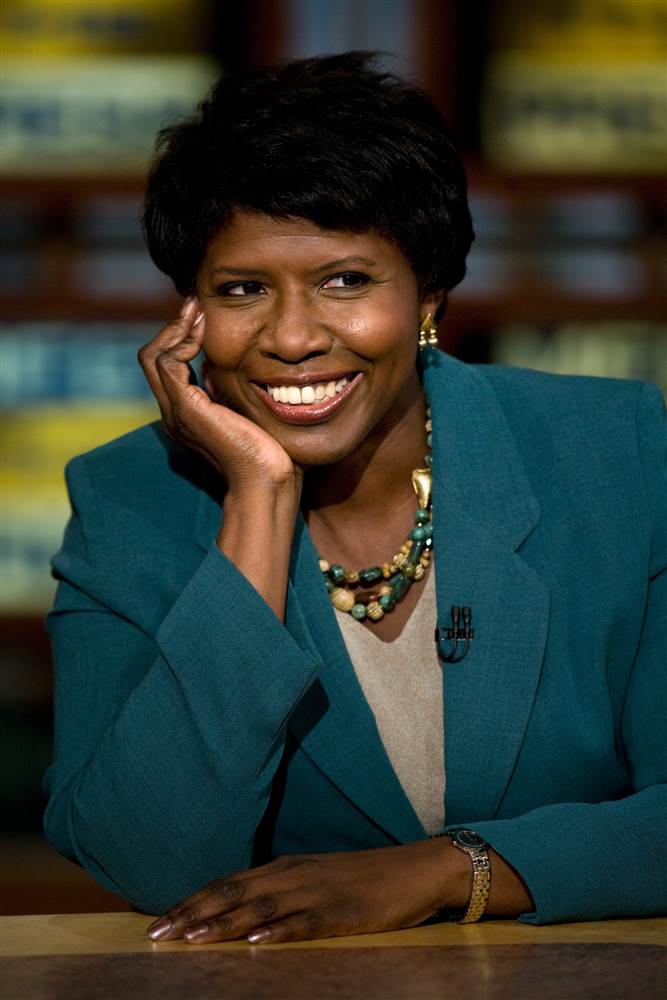

In April, Ifill took a leave from her position as the moderator and managing editor of Washington Week and co-anchor of PBS Newshour to address some health issues. At the time, a representative from the network said doctors were “encouraged with her progress, and she hopes to be back in the saddle as soon as possible.”
Throughout her career, Ifill covered seven presidential campaigns and moderated two vice-presidential debates: in 2004 between Dick Cheney and John Edwards, and in 2008 between Joe Biden and Sarah Palin. In February, she moderated a Democratic primary debate in Wisconsin between former Secretary of State Hillary Clinton and Sen. Bernie Sanders of Vermont, but her ill health led to recent leaves of absence from her PBS hosting duties.
Black television luminaries such as Bernard Shaw of CNN and Max Robinson of ABC performed highly visible anchor duties long before Ms. Ifill came on the national radar. But with her appointment in 1999 to lead what was then called “Washington Week in Review,” she became one of the first African American women to preside over a major national political show.
A preacher’s daughter, Ms. Ifill (pronounced EYE-ful) grew up in a home where the church was paramount but familiarity with the news of the day was essentially a second religion. The Ifills gathered nightly to watch network newscasts, and the children were expected to be conversant in the major events of the era, from the assassinations of civil rights leaders to the war in Vietnam.
Because of her father’s low pay, she liked to note that she was likely the only Washington journalist covering the Department of Housing and Urban Development who had also lived in federally subsidized housing. Later, as her career took her from The Washington Post and New York Times to NBC News and PBS, she reflected ruefully on her family’s struggle: “I make more money in a week than my father made in a year.”
She began her reporting career in the late 1970s, with stints in Boston and Baltimore, assertively carving a niche for herself as a political journalist at a time when black journalists and black female reporters, in particular, were rare in newsrooms and rarer still on the city hall beat. She recalled getting letters from readers (and once from a colleague) brimming with racial slurs and, in return, receiving a shrug from less-than-understanding editors.
As she rose from covering Maryland politics to presidential contests in 1988 and 1992, she began showing up as a panelist on Washington public affairs shows. But she also resisted many more such invitations as a “pundit,” fearing too many appearances would make her seem partisan or self-promoting personality than a serious reporter well-versed in politics, international news and cultural affairs.
She wrestled with job offers in broadcast, until Tim Russert, then-anchor of NBC’s “Meet the Press,” helped engineer her move to the network in 1994 — “What are you afraid of?” he reputedly asked.
While covering politics, she became a stalwart of Russert’s program, which established her reputation and rapport with audiences. In 1999, she took her expertise to public television, which had a noticeably smaller audience than the networks but could devote more time to what she considered complex and important issues of the day.
Gwendolyn Ifill was born in Queens, N.Y., on Sept. 29, 1955, and grew up as the fifth of six siblings. Her father, O. Urcille Ifill, was a Panamanian emigree who became a pastor in the African Methodist Episcopal church. Her mother, Eleanor Husbands, was a homemaker from Barbados.
The Ifills led an itinerant life for her father’s career, and she graduated from high school in Springfield, Mass.
She graduated in 1977 from Simmons College in Boston, with a bachelor’s degree in communications studies. A college mentor helped her land a reporting job with the Boston Herald American, but she recalled a stark reaction from the “old white guys” who filled the newsroom.
They “never seen anything like me — a college-educated black woman,” Ms. Ifill told an interviewer for the Harvard University’s School of Public Health. “And they didn’t know how to deal with me.”
Today is a great loss. Rest in peace, Gwen Ifill.

rip